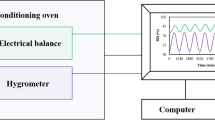Abstract
Factors influencing the rate of acetylation were examined based on the swelling of wood in the reaction solution and the dimensions of the wood sample. The activation energy of acetylation was also estimated. In a swelling test, it was found that wood swells thoroughly in acetic anhydride even without pyridine above 60°C. Therefore, pyridine may facilitate the acetylation process as a catalyst and not as a swelling agent. The weight gain, x (%), attained at reaction time t (h), for various compositions of acetylation solution or dimensions of wood sample were analyzed by applying an original rate equation [x = a × (1 − e−kt)1/n], where a is the ultimate weight gain (%), k is the rate constant (h−1), and n is a measure of the hindrance against the diffusion of reagent. The optimum volume fraction of pyridine in the pyridine-catalyzed acetylation was about 0.2. Accompanied by a rise in pyridine content, the reaction showed increased diffusion-controlled behavior. The rate constant, which is not affected by the dimensions of the wood sample, was estimated from which an activation energy of about 130 kJ/mol was calculated.
Similar content being viewed by others
Author information
Authors and Affiliations
Corresponding author
About this article
Cite this article
Minato, K., Ito, Y. Analysis of the factors influencing the acetylation rate of wood. J Wood Sci 50, 519–523 (2004). https://doi.org/10.1007/s10086-003-0598-7
Received:
Accepted:
Issue Date:
DOI: https://doi.org/10.1007/s10086-003-0598-7




